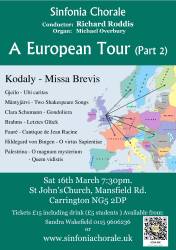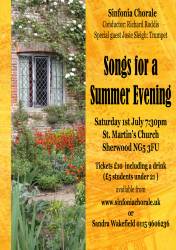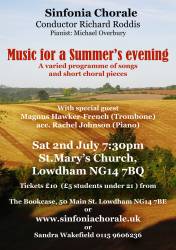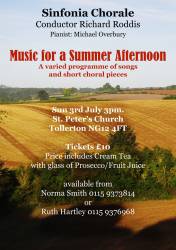Sinfonia Chorale - Spring Newsletter 2024
We hope that this newsletter finds you well!
After a successful (albeit a bit cold!) Come and Sing day, we are off to a flying start with our rehearsals for the March 16th concert. This is the European Tour, Part 2, during which our esteemed conductor, Richard Roddis, together with the wonderful organist, Michael Overbury, will lead us on a journey through different countries and musical times.
Our main piece for the evening will be the challenging, but moving, Missa Brevis by Zoltán Kodály (1882 – 1967). This Hungarian composer was also a linguist and philosopher and you might know him as the creator of the Kodály method of music education. He wrote many instrumental, choral and organ pieces but, apparently, encouraging and educating children was his lifelong passion. A statue of Kodály was commissioned after his death and the sculptor requested that it face a former playground, rather than the cathedral in Pécs, reflecting Kodály’s commitment.
Missa Brevis was originally composed as an organ mass but later rearranged for organ and mixed choir. The first performance was actually in one of the Budapest Opera House’s cloakrooms on 11th February 1945, during the siege of Budapest. Kodály and his wife were taking refuge here and, with the distant sound of gunfire outside, the company’s soloists sang, accompanied by a harmonium. After the war, the work (now with orchestration) was actually performed at Worcester Cathedral at the 1948 Three Choirs Festival.
We will also be singing pieces by Mäntyjärvi – two interesting compositions from his Shakespeare Songs, as well as Clara Schumann’s delightful Gondoliera, Saint Hildegard von Bingen’s atmospheric O virtus Sapientiae and Palestrina’s O magnum mysterium and Quem vidistis. The beautiful Cantique de Jean Racine by Gabriel Fauré will also be on the programme. Fauré (1845 – 1924) composed this sensitive and refined piece for a competition when he was just 20 years old.
Hildegard von Bingen (1098 – 1179), considered a patron saint of writers and musicians, was a very interesting, accomplished woman and created over 77 songs. She was born into a noble family and at an early age became a Benedictine nun, but she was only recognised as a saint and a Doctor of the Church in 2012. From the age of 3, she began receiving visions, which she believed were a gift from God. Hildegard kept these visions a secret until she was 42 and experienced a ‘midlife awakening’. Her Scivias or Know the Ways are illustrations and writings of these prophetic visions. She also wrote about medicine and natural remedies, very unusual for a woman in Europe at that time. Her attitude was very much about finding harmony and balance in mind, body and spirit because everything is interconnected. This approach is reflected in her musical compositions – she thought that we could ‘gain access to the angelic choruses’ through liturgical chants. It would be amazing to achieve this when we sing her piece!
Please join us on Saturday March 16th at 7:30pm at St John’s Church, Carrington, NG5 2DP for some wonderful music. There is something for everyone!
Tickets are £15, including refreshments, (£5 for students) and are available from Sandra Wakefield 0115 960 6236 or from the Choir's website.
Sinfonia Chorale
Sinfonia Chorale - Summer Newsletter 2023
Dear Friends
Summer greetings from Sinfonia Chorale!
Thanks so much to those of you who attended our Bach concert in March – we hope that you enjoyed it. We certainly had a lovely, uplifting time performing with the Baroque Orchestra, led by Nicolette Moonen!
Following the Easter holiday, we are back to rehearsing for the July concerts (Saturday 1st at 7:30pm and Sunday 2nd at 3.00pm), which promise to be an interesting and varied mixture of (mostly) a capella songs, from an eclectic selection of composers, such as Samuel Barber, Ernest Farrar, Percy Grainger and Irving Berlin.
We will also be presenting some of Jaakko Mäntyjärvi’s Shakespeare Songs. Born in Finland in 1963, Jaakko is a freelance translator and internationally renowned composer, mostly producing choral works. You will be able to hear more from him in our future concerts as well, when we will be taking the audience on a whistle-stop European tour!
We will also be joined by Josie Sleigh on Saturday evening. She is an excellent musician, the principal trumpet in the Nottingham Youth Orchestra, and will be continuing her studies at the Royal College of Music in September. It will be a wonderful opportunity to see this young soloist at the start of her career!
The concert on Saturday takes place at St Martin’s Church, Sherwood and the tickets are £10.00, with a glass of wine or juice included.
The Sunday concert is at 3.00pm in Oxton Village Hall. Josie will not be joining us for this event but the ticket price of £8.00 does include a delightful afternoon tea!
Please visit our website for more ticket information, or you can pay on the door.
Feel free to click/select the poster to download/print and distribute to your friends.
We look forward to seeing you!
Sinfonia Chorale
Sinfonia Chorale - Spring Newsletter 2023
Dear Friends
Warmest greetings from Sinfonia Chorale!
Some of you may have attended our recent Come and Sing/Play event, exploring Bach’s Magnificat and his Cantata 21, under the expert tutelage of Richard Roddis and Nicolette Moonen, with the talented Michael Overbury on the organ. The day received positive feedback and we definitely enjoyed it – even doing the washing-up (and the numerous other jobs) together was fun! Singing and playing the pieces is an exciting challenge – navigating the exhilarating runs and adding nuanced expression to the text can be very rewarding!
Johann Sebastian Bach (1685-1750) was much-admired by other musicians and the public. He was a composer in nearly every genre (apart from opera), as well as a virtuoso organist, violinist, teacher and wonderful craftsman. Bach was born into a very musical family – his father was a court and town musician and he studied music with his older brother, Johann Christoph, who was an organist. He also found time to father twenty children, from two marriages, but, sadly, only nine outlived him. He took up the prestigious post of Thomaskantor in Leipzig in 1723 and, also in this year, set the text of the Magnificat in a 12-movement composition in E-flat major. At some point he also inserted 4 hymns (Christmas interpolations) which we will include at our concert. In 1733 Bach altered the version, changing it to D major because of the trumpet tuning. This is now the standard, and one of his most popular vocal works. It is scored for 5 vocal parts, soloists and Baroque orchestra. The words of the Magnificat (praising God most highly) are from the Gospel of Luke, and are spoken by Mary to her cousin, Elizabeth, during the time when they were both pregnant.
Bach’s music is often intense, exciting, complex and takes the listener (and performer) on a thrilling journey through a variety of emotions. He composed hundreds of cantatas over his career - as a working musician he had to produce new pieces regularly and quickly for his different employers.
The church cantata, Ich hatte viel Bekümmernis (I had great sorrow) (BWV 21) was possibly composed during 1713 in Weimar, where Bach was a court musician for the Duke, and then performed in 1714. The text, which uses biblical quotations, was probably written by Salomon Franck, who was a librettist for many of Bach’s cantatas. It consists of two parts: one would have been performed before a sermon and one after, and it was considered to be ‘suitable for any occasion’.
A Baroque ensemble, soprano, tenor and bass soloists and an SATB choir perform this work, which weaves its way through themes of suffering and mourning, passing into movements of joyous praise. It was revised for different performances and Bach also used it in 1723, in his new role as Thomaskantor in Leipzig.
If you have the urge to listen to some inspiring music, it would be wonderful to see you at our concert on Saturday March 25th, 7.30pm, at Beeston Parish Church, Middle Street, Beeston, NG9 1GA. Tickets are £15 and £5 for students. They are available from our website or on the door.
Many thanks to you all for your continued support of the Choir - we are very appreciative and grateful!
Best wishes,
Sinfonia Chorale
Sinfonia Chorale - Autumn Newsletter 2022
Dear Friends
The sad news of the death of our Queen arrived just as this newsletter was going to be sent out. We would like to honour this gracious lady by performing pieces which we know were meaningful to her, and we will take this opportunity to commemorate her dignified reign, and life.
The concert will take place on Saturday November 5th, 7.30pm at Beeston Parish Church. Our music will reflect the celebratory nature of the Platinum Jubilee, as we perform works from the extensive reigns of the two Queen Elizabeths, linking the past with the present. There will be a wonderfully varied selection of music, including works by William Byrd, Judith Weir, Benjamin Britten and Gerald Finzi, amongst others.
Music played a large part in the life of Elizabeth I (1533 – 1603). She was an accomplished musician who played virginals, the lute and also sang. As a powerful ruler, she could act as a patron and many songs were written in praise of her – reflecting her connection to God, and also to the people.
Throughout her 70-year reign, Elizabeth II supported classical music and the arts. She actually studied music herself and enjoyed a wide variety of styles, as was reflected in her list of favourite songs! From this compilation (easy to find on the internet), we will be singing Irving Berlin’s Cheek to Cheek (1934/35), which Fred Astaire sang in the musical Top Hat. The Queen was also the patron of numerous musical charities, attended many events and honoured some wonderful musicians.
Born circa 1540 (d. 1623), the great English composer, William Byrd, began his professional career as organist and master of the choristers at Lincoln Cathedral. In 1570, he obtained the post of Gentleman of the Chapel Royal, which expanded his networking and composing possibilities. He shared the post of organist with the talented Thomas Tallis, with whom he also printed and marketed part-music and lined music paper. Queen Elizabeth I (r. 1558 – 1603) had granted them a monopoly for this venture. Byrd was a prolific composer over many genres, creating partsongs, fantasias, dances, consort songs, 3 Latin Masses, 4 Anglican Services and over 180 motets. He was a Catholic in an Anglican state and he and his wife were known to be recusants but Byrd managed to stay in favour with the Queen, composing for her and avoiding major punishment (apart from heavy fines). He was also writing Masses for Catholics to use secretly and we will be singing one of these - his beautiful Mass for Four Voices (1592/93). The settings lacked title pages, dates and the name of the printer and it is thought that this made them harder to trace, therefore anyone involved could avoid potential arrest. They were also published in single bifolia so they were easier to conceal. Times change, of course, and now the pieces are commonly heard in Anglican cathedrals.
Jumping forwards, Judith Weir was born in 1954 into a Scottish family but grew up near London. In 2014 she was appointed to the 395-year old royal post of Master of the Queen’s Music and has written operas, theatrical works, instrumental, solo and choral pieces, as well as for national and royal occasions. Her delightful setting of I Love All Beauteous Things was commissioned by the Chapter of St Paul’s Cathedral to mark the 90th birthday of HM The Queen. The words are by Robert Bridges (1844-1930), who was Poet Laureate in the year Elizabeth II was born (1926).
Benjamin Britten’s Jubilate Deo (1961) was written for St George’s Chapel, Windsor at the request of HRH The Duke of Edinburgh. Despite the fact that the Duke actually chose this as one of the pieces of music to be played at his funeral, this 4-part choir and organ piece is lively and uplifting.
We will also be singing O Taste and See, the quietly moving piece written by Vaughan Williams (1872-1958) for the 1953 Coronation service. A set of 10 partsongs A Garland for the Queen was also created for this occasion (performed the evening before) and this collection echoes The Triumphs of Oriana (1601), a volume of madrigals by different composers, written in praise of Elizabeth I and published by Thomas Morley.
You will be pleased to hear that our talented accompanist, Michael Overbury, will also be playing Byrd’s Fantasia in C (BK25) and Walton’s Crown Imperial for the concert. We look forward to hearing his accomplished performance of these treats.
We are really looking forward to presenting some beautiful music from these eras, under the expert direction of our conductor, Richard Roddis, and it would be marvellous to see you all at our concert. Tickets are £15 (£7 for full-time students under 21) and include a glass of wine or fruit juice. They are available from our website or from Sandra Wakefield on 0115 9606236.
Best wishes,
Sinfonia Chorale
Sinfonia Chorale Summer Newsletter 2022
Dear Friends,
Summer is fast approaching and with it our July concerts!
Saturday the 2nd of July, 7.30pm, at St Mary’s Church, Lowdham sees our Music for a Summer’s Evening programme, which will include a varied selection of songs and short choral pieces. Palestrina’s O Holy and Glorious Trinity, Kodaly’s Matra Pictures and Ernst Toch’s Geographical Fugue are amongst the delights on offer.
Our wonderful accompanist, Michael Overbury, will be with us for both concerts. We will also be joined by a special guest on Saturday evening – Magnus Hawker-French, who is an accomplished trombone player (accompanied by Rachel Johnson on piano). Magnus was Nottingham’s Young Brass Player of the year in 2019 and has performed at various venues across Nottingham.
Please come and join us for what should be, a lovely concert - we would love to see you there!!
Tickets are £10 (£5 for students under 21) and are available from:
- The Bookcase, 50 Main St, Lowdham,
- The Sinfonia Chorale website
- contact Sandra Wakefield on 0115 9606236.
On Sunday the 3rd of July we will be performing at the lovely St Peter’s Church, Tollerton, NG12 4FT, at 3.00pm.
Magnus will not be joining us there but we will be singing a selection of pieces from those sung at Lowdham.
Tickets, available from Norma Smith on 0115 9373814 or Ruth Hartley on 0115 9376968 will be £10, and include a delicious cream tea with prosecco or fruit juice.
We hope that you are having a delightful Spring and we look forward to seeing you in July!
Best wishes to you all,









